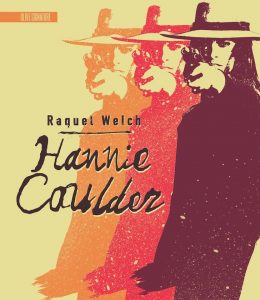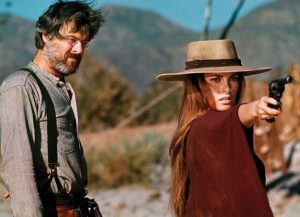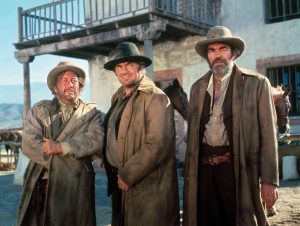Note: This Special Edition Blu-ray was released on November 15th as part of the Olive Signature line.
 Hannie Caulder is a strange film to watch. Tonally imbalanced, it combines various disparate elements to create a bizarre patchwork within its Western framework. The new Blu-ray is a stellar product, with an incredible new restoration and some great bonuses. Yet the feature itself is unavoidably controversial; many of the participants in the extra features of the new disc from Olive Signature Films question and express doubts about the intent of one particular aspect of the movie.
Hannie Caulder is a strange film to watch. Tonally imbalanced, it combines various disparate elements to create a bizarre patchwork within its Western framework. The new Blu-ray is a stellar product, with an incredible new restoration and some great bonuses. Yet the feature itself is unavoidably controversial; many of the participants in the extra features of the new disc from Olive Signature Films question and express doubts about the intent of one particular aspect of the movie.
That is, of course, tied to the trauma that befalls the lead character, Hannie Caulder (played by the stunning Raquel Welch). The movie has been referred to film scholars as an early “rape-revenge” film. It opens with a trio of bandit brothers (played by Ernest Borgnine, Jack Elam and Strother Martin) rampaging and killing. When they rob a bank and end up on a nearby farm, they rape Caulder, murder her husband and burn down the homestead. Furious and seeking revenge, she befriends a bounty hunter named Price (Robert Culp), who shows her the ropes of gun-slinging.
 The plot is unbelievably simple, with little more to develop story wise besides the central vengeance plot and a potential relationship forming between Caulder and Price. Otherwise, there’s very little else going on. At least the rapport between the leads is excellent. When Price is training Caulder and telling her of the horror of being in the business of killing, there’s plenty of great interplay. Culp, as sort of a thinking man’s assassin and Welch work well together. When Caulder is brought into action, the movie is also effective. It’s fun seeing a strong and empowered female protagonist unafraid to face down her targets toe-to-toe and with a scowl on her face. She’s a beautiful and powerful presence and this was an extremely rare sight at the time.
The plot is unbelievably simple, with little more to develop story wise besides the central vengeance plot and a potential relationship forming between Caulder and Price. Otherwise, there’s very little else going on. At least the rapport between the leads is excellent. When Price is training Caulder and telling her of the horror of being in the business of killing, there’s plenty of great interplay. Culp, as sort of a thinking man’s assassin and Welch work well together. When Caulder is brought into action, the movie is also effective. It’s fun seeing a strong and empowered female protagonist unafraid to face down her targets toe-to-toe and with a scowl on her face. She’s a beautiful and powerful presence and this was an extremely rare sight at the time.
Another big plus is the stellar photography of Edward Scaife (Curse of the Demon, The Dirty Dozen). The movie is gorgeously shot with attention paid to the incredible landscapes. This was a small UK production with an American cast, but it was shot in Spain (where most Spaghetti Westerns were filmed). The lighting is also excellent on its star Welch and the some of the seaside backdrops shot at sunset during magic hour couldn’t be more impressive. The transfer is incredibly clean and really captures the natural beauty on display. Also helping the film is a surprisingly strong and memorable score.
One fascinating bit of weirdness is the presence of a black-clad gunslinger (Stephen Boyd) who appears in the middle of the film and then shows up again during the climax. He seems to figuratively float around and follow Caulder, although he has no dialogue and nothing is ever revealed about him. It’s the strangest thing and all I could come up with is that he’s some sort of metaphoric Grim Reaper, an eerie presence that signifies violence on the horizon. Who knows? It’s curious all the same.
 What is disconcerting about the movie are, as written, the villains themselves. After the ugly opening with Caulder, the movie continually cuts back to the brothers, comically arguing and committing crimes from town to town. Strangely, there’s a lot of bumbling, slapstick humor from the trio. While awful characters can certainly be flippant and foolish in a story, they’re simply dimwitted and it’s pretty clear that these sections have a tone-deaf quality to them. Their hi-jinx serve no purpose other than to provide ill-timed humor. There are other ugly stereotypes presented in the film that don’t help matters either.
What is disconcerting about the movie are, as written, the villains themselves. After the ugly opening with Caulder, the movie continually cuts back to the brothers, comically arguing and committing crimes from town to town. Strangely, there’s a lot of bumbling, slapstick humor from the trio. While awful characters can certainly be flippant and foolish in a story, they’re simply dimwitted and it’s pretty clear that these sections have a tone-deaf quality to them. Their hi-jinx serve no purpose other than to provide ill-timed humor. There are other ugly stereotypes presented in the film that don’t help matters either.
 As for the extras on the disc, they are all excellent. There’s a short on the history of the production company responsible for the film, going into their background in producing genre pictures. It’s all explained by PhD Sir Christopher Frayling, known for his work and study in the field of popular culture. There’s also a piece called “Exploitation or Redemption?” in which film scholar Ben Sher addresses the issue of what is positive about the feature as well as its negative and disconcerting attributes. Best of all, Western authority and film director Alex Cox (Repo Man, Sid & Nancy, Walker) provides a very insightful and informative commentary. There’s also an essay by critic Kim Morgan in defense of the movie.
As for the extras on the disc, they are all excellent. There’s a short on the history of the production company responsible for the film, going into their background in producing genre pictures. It’s all explained by PhD Sir Christopher Frayling, known for his work and study in the field of popular culture. There’s also a piece called “Exploitation or Redemption?” in which film scholar Ben Sher addresses the issue of what is positive about the feature as well as its negative and disconcerting attributes. Best of all, Western authority and film director Alex Cox (Repo Man, Sid & Nancy, Walker) provides a very insightful and informative commentary. There’s also an essay by critic Kim Morgan in defense of the movie.
For me, Hannie Caulder is a weird one. I think that writer/director Burt Kennedy (Support Your Local Sheriff!, Return of the Magnificent Seven) was so well-versed and ensconced in macho Western tropes that he really misjudged the handling of this subject matter; there’s nothing here suggesting any sort sensitivity and subtlety to the film’s themes. That’s probably why it seems so confused and off-putting early on, as well as during the bits with the antagonists. In some respects, it’s an early example of female empowerment in cinema and yet it also possesses an ugly and exploitative streak. A step forward and backward literally at the same time. However one may feel, it’s an interesting feature sure to spark conversation and debate for years to come.


